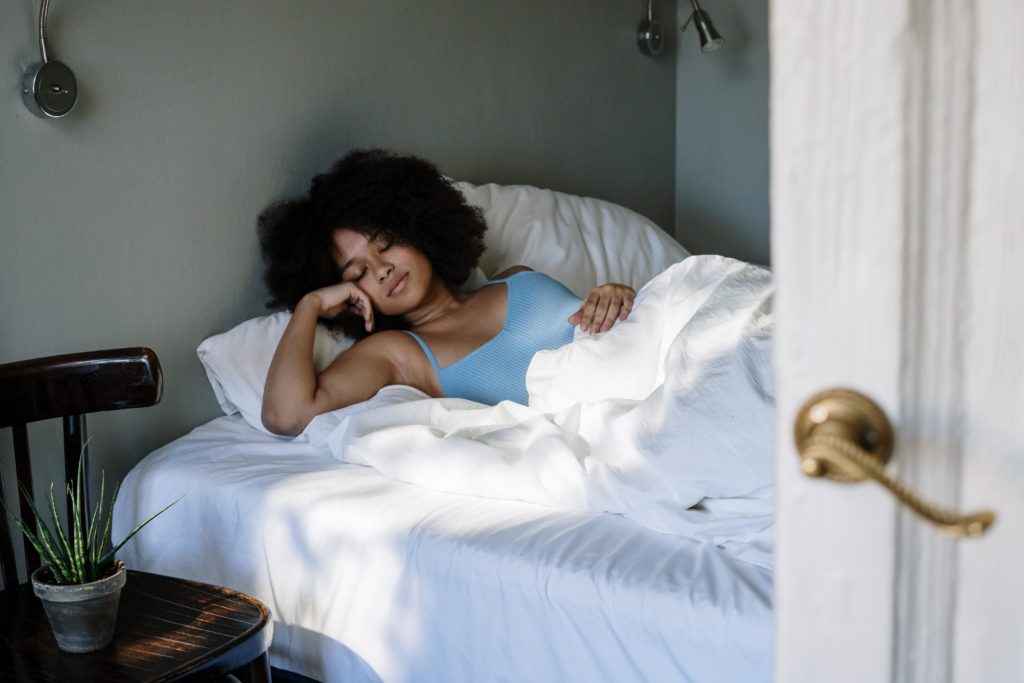Sleeplessness is among the most frustrating parts of menopause. It makes you feel sluggish and less productive, and can lead to consuming too much caffeine and increase hunger. Worse, a lack of sleep can lead to long-term health issues. Sleeplessness is common for menopausal women, with 61 percent of menopausal women reporting insomnia, according the the National Sleep Foundation.
Hot flashes and night sweats can be blamed for some of the decline in sleep quality experienced around the time of menopause. Even though the average hot flash lasts only about three minutes, a sudden rise in body temperature is bound to wake you up, preventing truly restful sleep.
So what can you do to get more shut-eye? Here are a few ways to get better sleep during menopause.
Try a natural sleep aid
If you’re looking for a more natural way to fall asleep, one of the following may help.
- Melatonin: One of the more popular natural sleep aids, melatonin is produced naturally in our bodies and gives the signal to our brain that it’s time to snooze. It’s especially useful to those with jet lag or with irregular sleep schedules. The downside? Melatonin may cause stomach issues for some, and it’s not intended for long-term use.
- Valerian root: As a natural remedy for anxiety, depression, and other menopause symptoms, valerian root can also help promote more restful sleep. However, it’s not intended for long-term use either.
- Magnesium: Aside from helping with countless processes in the body, magnesium can help quiet the mind and body, making it easier to fall asleep. If you have persistent sleep issues, you may want to consider a magnesium supplement.
- Lavender: There’s a reason lavender is a popular aromatherapy treatment. Its soothing scent is believed to help ease people with mild insomnia into sleep. With few known side effects, it’s considered safe for most people.
Create a bedroom oasis
Your bedroom should be a soothing place where you can retreat and relax. Of course, that’s not always realistic, but there are a few ways you can make it a little more sleep friendly.
- If a tidy room gives you peace of mind, giving your bedroom a good cleaning could be just what the doctor ordered.
- A cooler temperature will help keep night sweats away. Aim for a temperature between 60 and 67 degrees.
- Evaluate your mattress, pillows, and linens; consider investing in high-quality ones that you love.
- Remove work materials, your laptop, and/or your TV from your room for a healthier sleep environment.
- To strengthen your brain’s association between your bed and sleep, and ultimately increase the quality of your zzz’s, use your bed only for sleep and sex.
- Create a soothing bedtime routine to help you enjoy your new oasis and take the anxiety out of bedtime.
Stick to a routine
Your body needs time to wind down after a long day, so use the hour or two before bed to do a calming activity, like reading or gentle stretching. During this time, you should stay away from electronics, including your phone. It’s important to stick to the same sleep schedule, even on weekends. This helps regulate your body’s clock and leads to more restful sleep.
Finally, avoid alcohol, cigarettes, and heavy meals right before bed, as each of these can disrupt sleep. If you do get hungry, a light snack about 45 minutes before bedtime will help you avoid indigestion.
Eat healthy and exercise
It’s more important than ever to maintain a healthy diet during perimenopause. Now is the time to check in on your diet: Are you consuming caffeine and sugar throughout the day? Are you reaching for an extra glass of wine before bed? Each of these things can disrupt your sleep cycle, preventing you from getting a restful night’s sleep. Spicy and acidic foods may trigger night sweats, so it’s best to avoid those as well.
Finally, exercising daily for 30 to 45 minutes is ideal for good rest. The National Sleep Foundation recommends vigorous exercise, but any exercise will do. If you can’t hit the gym, a brisk walk works.
FemmePharma has been helping women navigate menopause for over two decades. No matter where you are in your journey, you deserve to have knowledgeable, intimate healthcare partners to help you feel your best. Explore our other articles, podcast episodes with women’s health experts, and products to ease your transition into menopause.
